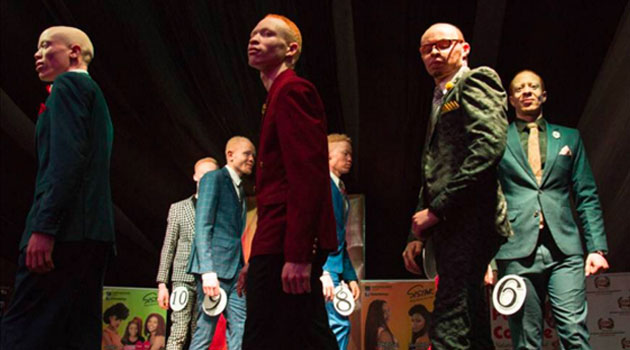
The albinism society of Kenya organised an Albino Beauty Contest which was the first of its kind where Ontinta was pronounced Mr Albinism and Ngatia the first runner-up/THOMSON REUTERS FOUNDATION
NAIROBI, Kenya, Nov 19 – As a young boy, he didn’t know he was different.
It was until he went to school that he realised he was not like other children.
He was detested – because his skin colour was different.
He was not white and he was not black.
This is the sad story of Clinton Ontinta who represents about 15,000 other people living with albinism in sub-Saharan Africa.
“In the whole school I was unique. People would turn their heads to look at you. When somebody calls you names, then you see you are different,” Ontinta said in an interview with the Thomson Reuters Foundation.
For Lucianah Nyawira she was discriminated by her own father as soon as she was born – it was her mother’s mistake that she was born that way.
“When I was born, my dad was like ‘you cheated on me with a white guy. So he chased her away. So, my mum brought me up on her own.”
But even after Nyawira and her mother moved back to her grandmother’s home, she faced a rough world of rejection and humiliation.
“We were living in my grandmother’s house. People were coming telling the family that I am a curse to the village and to the family.”
John Ngatia was lucky that from the onset he was taken to a special school where people understood that albinism is a congenital disorder.
But he dreaded his life outside school.
Some people saw him as a walking bank. Because of his skin colour, they equated him to some millions of dollars.
“Home, that’s where I was seeing the reality of things. There is a time I was very angry. There is a person who came in front of my eye and called, ‘do you know you are money?”
“In Tanzania, they sell people with albinism for ritual things. So here they saw it was a way of getting money.”
According to research, witch doctors are willing to pay as much as $75,000 for a full set of albino limbs for use in black magic.
It is the most dehumanising market that to date has remained a big threat to people living with albinism.
“We are hunted like the way animals are hunted. Only that if you kill an albino, there is good money for it,” a college student living with albinism said.
“Sometimes we fear to be betrayed because we know of other albinos betrayed by their families and even friends.”
They are the heart wrecking stories that albinos especially those in Africa apart from being discriminated because of their condition, they fear for their life every single day.
Though it is not an easy affair to push for their acceptance in the highly rebellious society, the least thing some organisations have done to help them is develop events to boost their confidence and help them discover their talents.
The albinism society of Kenya organised an Albino Beauty Contest which was the first of its kind where Ontinta was pronounced Mr Albinism and Ngatia the first runner-up.
It was an historic event that left an indelible mark in the lives of the albinos who had gathered to participate and support people who for the longest time have been discriminated.









































